2023年高考英语复习专题课件 并列句和状语从句(54张)
文档属性
| 名称 | 2023年高考英语复习专题课件 并列句和状语从句(54张) | 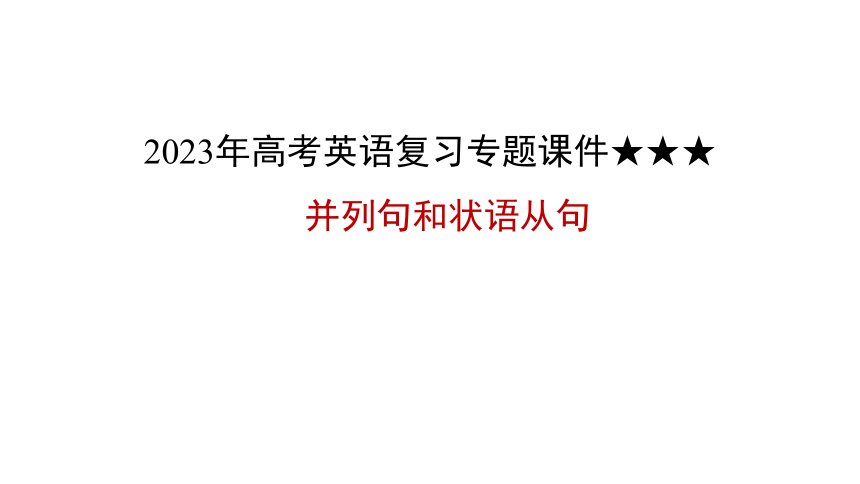 | |
| 格式 | ppt | ||
| 文件大小 | 2.3MB | ||
| 资源类型 | 教案 | ||
| 版本资源 | 通用版 | ||
| 科目 | 英语 | ||
| 更新时间 | 2023-03-13 14:31:13 | ||
图片预览

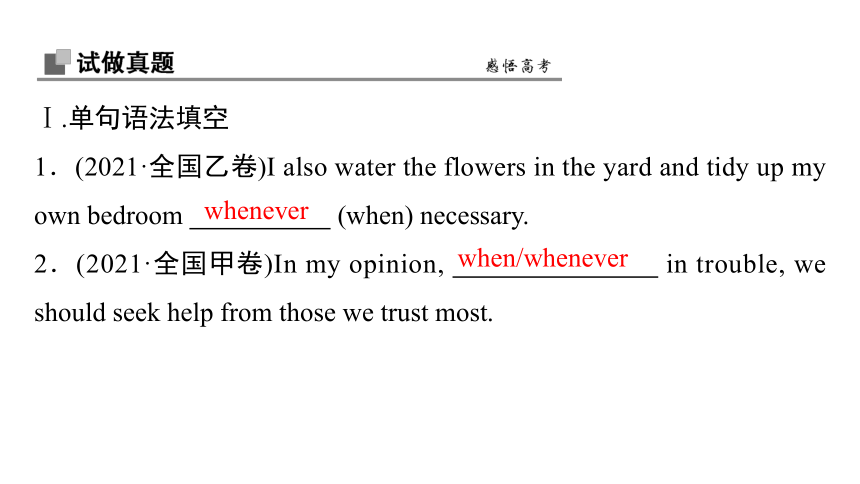
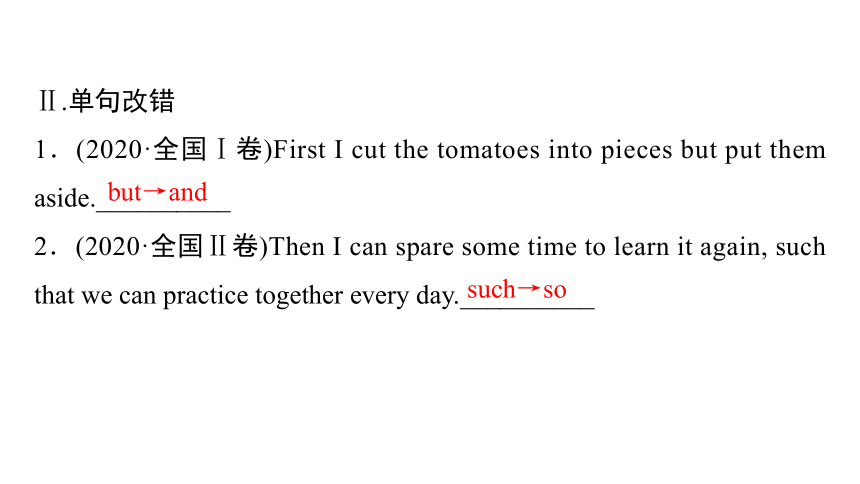
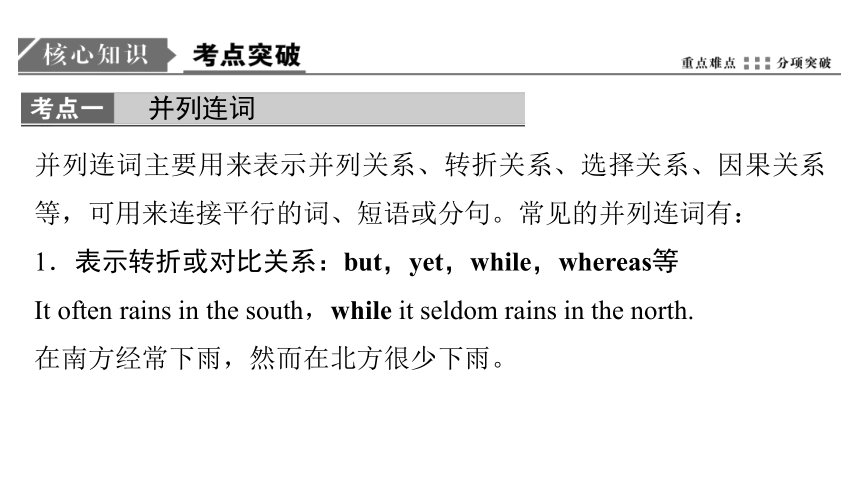
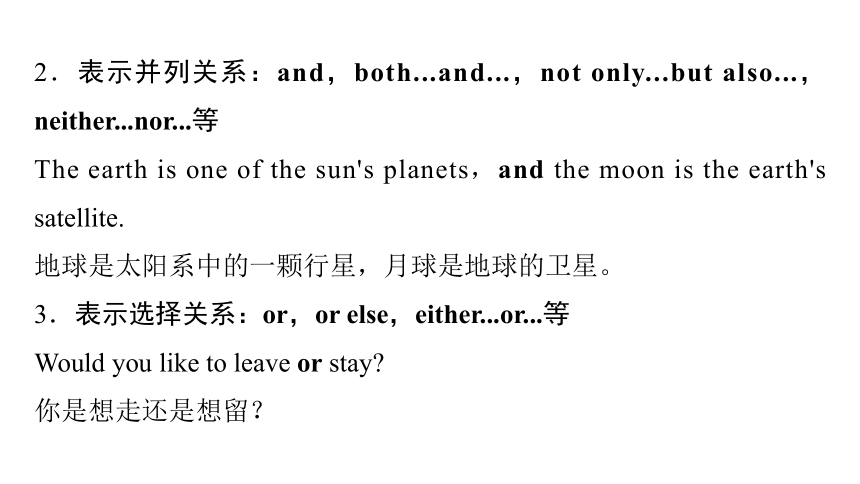
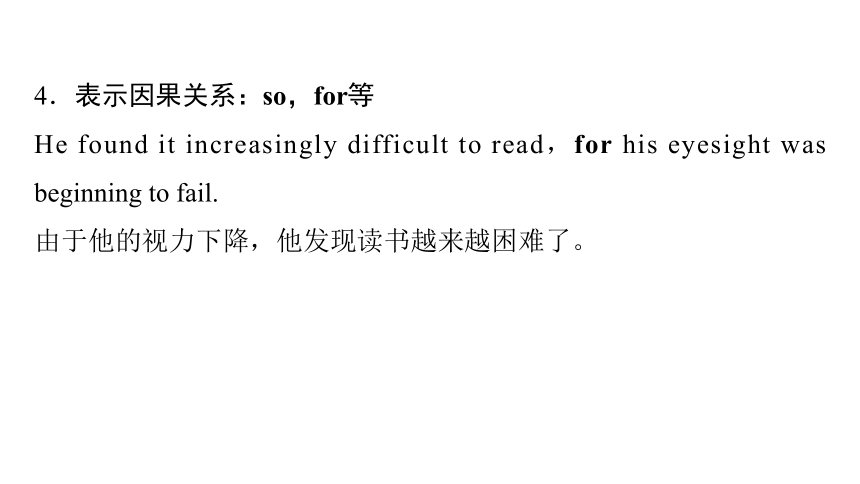
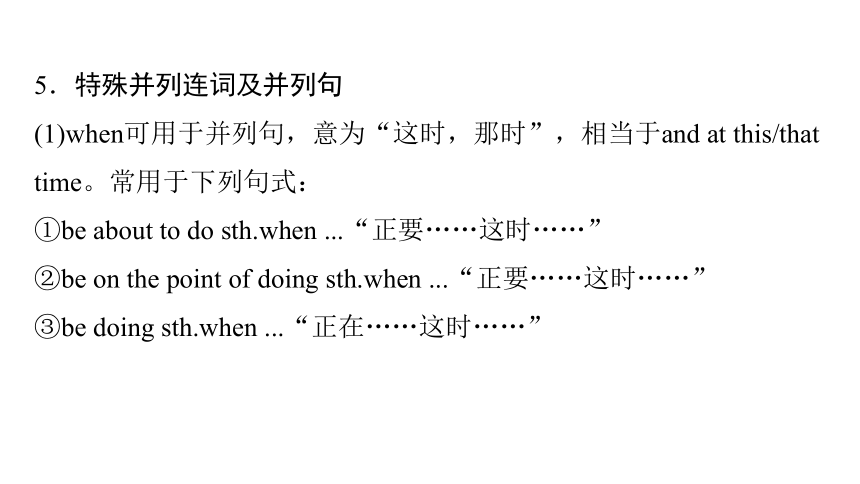

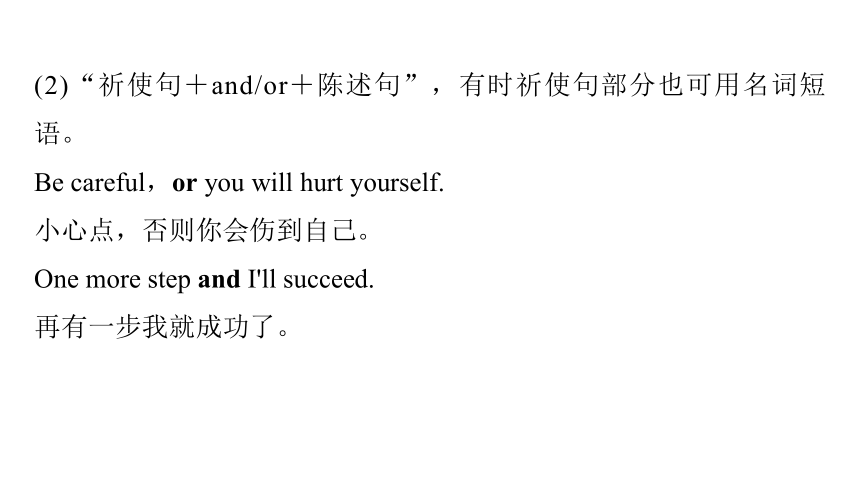
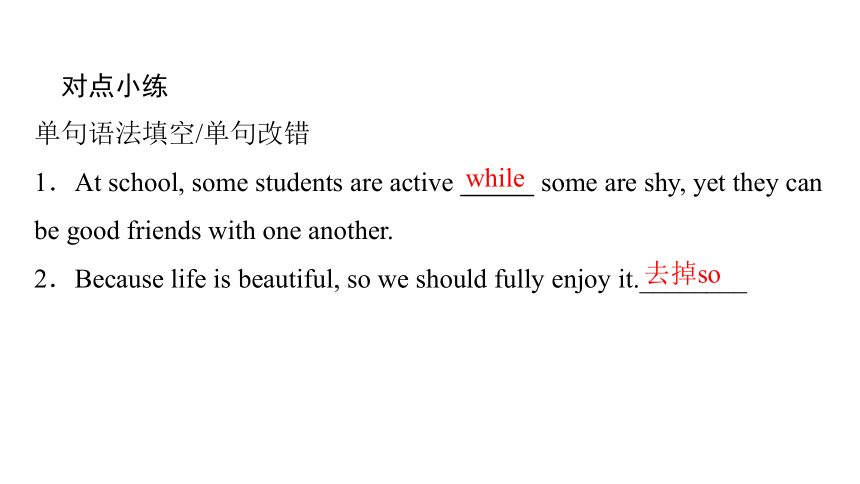
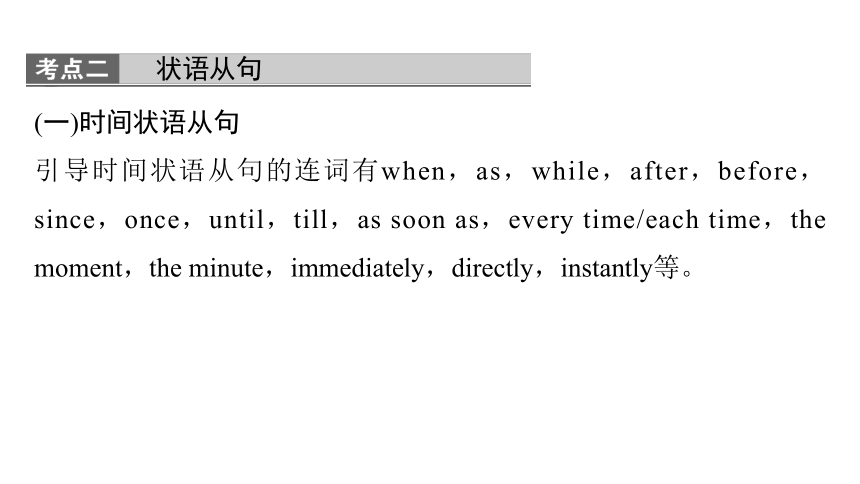
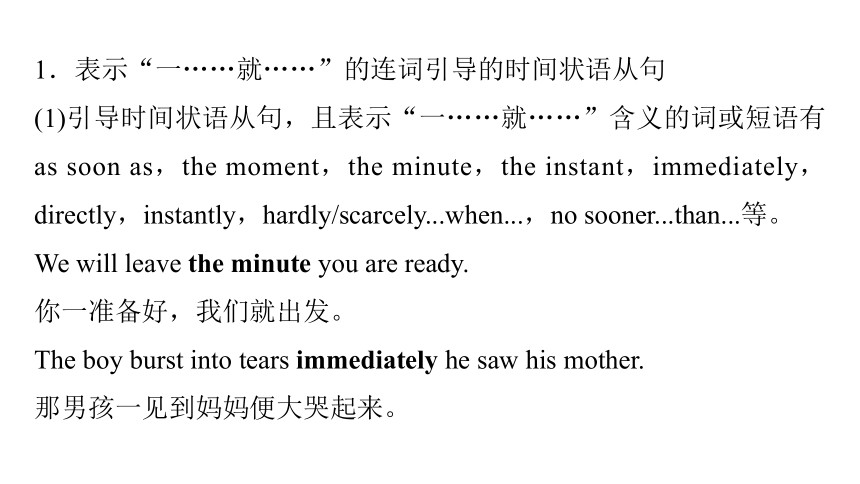
文档简介
(共54张PPT)
2023年高考英语复习专题课件★★★
并列句和状语从句
Ⅰ.单句语法填空
1.(2021·全国乙卷)I also water the flowers in the yard and tidy up my own bedroom (when) necessary.
2.(2021·全国甲卷)In my opinion, in trouble, we should seek help from those we trust most.
whenever
when/whenever
Ⅱ.单句改错
1.(2020·全国Ⅰ卷)First I cut the tomatoes into pieces but put them aside.__________
2.(2020·全国Ⅱ卷)Then I can spare some time to learn it again, such that we can practice together every day.__________
but→and
such→so
并列连词
并列连词主要用来表示并列关系、转折关系、选择关系、因果关系等,可用来连接平行的词、短语或分句。常见的并列连词有:
1.表示转折或对比关系:but,yet,while,whereas等
It often rains in the south,while it seldom rains in the north.
在南方经常下雨,然而在北方很少下雨。
2.表示并列关系:and,both...and...,not only...but also...,neither...nor...等
The earth is one of the sun's planets,and the moon is the earth's satellite.
地球是太阳系中的一颗行星,月球是地球的卫星。
3.表示选择关系:or,or else,either...or...等
Would you like to leave or stay
你是想走还是想留?
4.表示因果关系:so,for等
He found it increasingly difficult to read,for his eyesight was beginning to fail.
由于他的视力下降,他发现读书越来越困难了。
5.特殊并列连词及并列句
(1)when可用于并列句,意为“这时,那时”,相当于and at this/that time。常用于下列句式:
①be about to do sth.when ...“正要……这时……”
②be on the point of doing sth.when ...“正要……这时……”
③be doing sth.when ...“正在……这时……”
④had (just) done sth.when ...“刚……这时……”
She had just finished her homework when her mother asked her to practice playing the piano yesterday.
昨天她刚完成家庭作业,她妈妈就让她练习弹钢琴。
(2)“祈使句+and/or+陈述句”,有时祈使句部分也可用名词短语。
Be careful,or you will hurt yourself.
小心点,否则你会伤到自己。
One more step and I'll succeed.
再有一步我就成功了。
?对点小练
单句语法填空/单句改错
1.At school, some students are active some are shy, yet they can be good friends with one another.
2.Because life is beautiful, so we should fully enjoy it.________
while
去掉so
(一)时间状语从句
引导时间状语从句的连词有when,as,while,after,before,since,once,until,till,as soon as,every time/each time,the moment,the minute,immediately,directly,instantly等。
状语从句
1.表示“一……就……”的连词引导的时间状语从句
(1)引导时间状语从句,且表示“一……就……”含义的词或短语有as soon as,the moment,the minute,the instant,immediately,directly,instantly,hardly/scarcely...when...,no sooner...than...等。
We will leave the minute you are ready.
你一准备好,我们就出发。
The boy burst into tears immediately he saw his mother.
那男孩一见到妈妈便大哭起来。
(2)在hardly/scarcely...when ...,no sooner ...than ...结构中,主句用过去完成时,when或than所在的从句用一般过去时;当no sooner...和hardly/scarcely...位于句首时,主句要用部分倒装。
He had no sooner finished his speech than the students started cheering.
他刚完成演讲学生们就开始欢呼起来。
Scarcely had she heard the sad story when she burst out crying.
她一听到这个悲伤的消息,就失声痛哭。
2.before与since的常用句式
连词 词义 常用句式
before 在……之前,还未……就……;……才……;趁……,还没来得及……就…… (1)It will (not) be+一段时间+before ...“(没有)过……(时间)才……”
(2)It was not long before ...“不久,就……”
(3)It was+一段时间+before ...“过了……(时间) 才……”
连词 词义 常用句式
since 自从……以来 It is/has been+一段时间+since ...(从句用一般过去时)
There is only one more day to go before your favorite music group play live.
距离你最喜欢的乐队现场表演仅有一天的时间了。
As is reported,it is over 100 years since Tsinghua University was founded.
正如所报道的,自清华大学建立以来已有一百多年了。
3.every time,each time,next time,the first time,by the time等引导的时间状语从句
By the time I got to the station,the bus had already driven off.
我到车站的时候,公共汽车已经开走了。
(二)地点状语从句
where和wherever皆可引导地点状语从句,where指某一固定地方,而wherever指任何一个地方。
I'll go where he went.
我要去他去过的地方。(特定地点)
I'll go wherever he goes.
他去哪儿我就去哪儿。(任意地点)
[特别提醒] where引导的定语从句和状语从句的区别。
引导状语从句时,where是从属连词,从句修饰主句的谓语动词,其前没有表示地点的名词;引导定语从句时,where是关系副词,在从句中作地点状语,其前有表示地点的名词作先行词。
Put the medicine in the place where children can't reach it.(定语从句)
Put the medicine where children can't reach it.(状语从句)
把药放在孩子们够不到的地方。
(三)原因状语从句
1.because为常用词,其语气最重,且说明的是直接原因,用来回答why引导的问句。
I couldn't see Helen's expression,because her head was turned.
我看不到海伦的表情,因为她转过头去了。
2.as,since,for和now that语气较弱,常用来表示一些显而易见或对方知道的原因。since译为“既然,鉴于”时不可用as替换。
As it's raining,you'd better take a taxi.
下雨了,你最好坐出租车。
We thought that, since we were in the area, we'd stop by and see them.
我们想,既然到了这个地方,就该顺便去看看他们。
He is so young that he cannot go to school.
他太小了以至于不能上学。
It is such fine weather that we all want to go out for a walk.
天气这么好,我们都想出去散散步。
(五)目的状语从句
1.so that/in order that引导的目的状语从句中常用情态动词can,could等。in order that引导的目的状语从句可以放在主句之前或之后,而so that引导的目的状语从句只能放在主句之后。
Take action today so that/in order that you won't miss your opportunity next time.
今天就行动起来,这样下次机会来时你就不会错过了。
[特别提醒] 当从句主语与主句主语一致时,可用“so as to/in order to+动词原形”替换。
He worked day and night in order that he could succeed.
=He worked day and night in order to succeed.
为了获得成功,他夜以继日地工作。
2.in case所引导的状语从句中,谓语可以用虚拟语气,形式为“(should+)动词原形”,也可以不用虚拟语气。
You may leave the key at home in case one of us should think of/thinks of coming back.
你可以把钥匙留在家里,以免我们中有人想要回来。
(六)条件状语从句
引导条件状语从句的连词(词组)有if,unless,so/as long as,in case
(如果),on condition that,suppose/supposing (that),providing/provided (that)等。
1.条件状语从句中如果主句是将来时,条件状语从句用一般现在时。如果条件状语从句中出现过去时,则为虚拟条件句,那么主句要用相应的虚拟语气形式。
If he had listened carefully,he would have done it better.
如果他认真听讲的话,他会做得更好些。
2.unless相当于if ...not,在虚拟条件句中可用if ...not,但不能用unless。
She says that she'll have to close the shop unless business improves.
她说如果生意不见什么起色的话,她就将店关了。
If she were not too silly,she would understand it.
要不是她太笨的话,她就理解了。
(七)让步状语从句
引导让步状语从句的连词(词组)有although,though,even if,even though,as,whether,no matter what/who/how/where/when(=whatever/whoever/however/wherever/whenever),while (一般置于句首)。
1.though与although常可互换使用。though/although引导让步状语从句时,后面的主句不能用but,但可用yet或still。
Although/Though she is smart,(still) she studies hard.
虽然她很聪明,但她还是用功学习。
2.as/though引导让步状语从句时,从句的表语、状语或谓语中的实义动词需提前至句首,如果表语是带冠词的名词,冠词需要省略。
Pop star as she is,she still needs to improve.
尽管她已经是一个流行歌手,但仍需努力。
Try as he might,he could not find a job.
尽管他尝试过了,可是他还是找不到工作。
Tired though he was,he continued working.
他虽然很累,但还是继续工作。
3.“疑问词+ ever”引导的让步状语从句
“where/what/who/whom/when/which/how+ ever”表示“无论……”,引导让步状语从句时,相当于no matter where/what/who/whom/when/which/how。
However/No matter how great the difficulties are,we must complete the task on time.
不管困难有多大,我们都必须按时完成任务。
(八)方式状语从句
方式状语从句常由as(按照),just as(正像),as if=as though (仿佛,好像;从句可用虚拟语气)等引导。
The old lady treats the boy as if he were her own son.
这个老太太对待这个男孩就像是自己的儿子一样。
(九)比较状语从句
1.引导比较状语从句的连词(词组)有:as...as,not so/as...as,than等。
2.as和than引导的从句,常省去与主句中相同的部分,只留下相比较的部分;常用替代动词do等形式代替与主句相同的谓语部分。
It's warmer in spring than (it is) in winter.
春天比冬天暖和。
He doesn't speak English as well as you do.
他英语说得不如你好。
?对点小练
单句语法填空/单句改错
3.Air pollution is getting more and more serious, so we must take action it is too late.
4. watching TV, children do not merely absorb words and images.
5. (suppose) that they refuse us, who else can we turn to for help
before
While
Supposing/Suppose
6.I have fallen in love with journalism when I was a child.__________
when→since
Ⅰ.单句语法填空
1. money is necessary for a happy life,it can't buy happiness.
=Money is necessary for a happy life, it can't buy happiness.
2.He got up late he missed the first bus.
=He missed the first bus he got up late.
Although/Though
but
so
because
3.(2021·浙江1月卷)In a study of 33 years of trends in Body Mass Index (体重指数) across 200 countries,the scientists found that people worldwide are getting heavier that most of the rise is due to gains in BMI in rural areas.
4.(2020·新高考全国Ⅰ卷)They kept their collection at home until it got too big until they died,and then it was given to a museum.
5.(2019·全国Ⅱ卷)I work not because I have to, because I want to.
and
or
but
6.They had no sooner finished the survey by asking the parents the same questions three years later they found that 18 percent of kids involved in the study were obese.
7.They are not like us to finish it in one drink, prefer to drink by taking a small amount at a time.
8. TCM has been widely accepted,it still faces challenges.
than
but
Although/Though/While
9.Yesterday was a crazy day.I felt very tired I had tons of work stuff going on.
10.(2020·全国Ⅲ卷) he asked the villagers on the banks of the river where he could find the legendary (传奇的) artist,they smiled and pointed down the river.
because
When/As
Ⅱ.语法与写作
1.无论我们的团队在哪里训练,我们都会尽力而为,我们都希望能赢。
,we will try our best and we all want to be the winner.
2.李江推荐中国传统服装,而苏华更喜欢校服。
Li Jiang recommends the traditional Chinese dress _________________
_________________.
No matter where/Wherever our team are training
while Su Hua prefers
the school uniform
3.当老师告诉我们这个以“劳动最光荣”为主题的活动时,我们都欢呼起来。
about the programme with the theme “Working is most beautiful”,we all cheered up.
4.如果你还有其他问题,请随时告诉我。
,please feel free to let me know.
The moment our teacher told us
If you have further questions
5.如果你感兴趣,你可以发送电子邮件至12345@或亲自报名。
,either you may send an email to 12345@ or you can sign up in person.
If you're interested in it
Ⅲ.语法填空
Tea is one of the most favored drinks in our life.However,the origin of tea is lost among history 1. tales. What can be roughly confirmed is that tea originated in the southwest of China. According to ancient stories, the first person 2. (discover)the effects of tea is said to be Shennong—the father of agriculture and herbal medicine in China. It 3. (say) that Shennong once tried 72 different kinds of poisonous plants in a day and he 4. (lie) on the ground, barely
alive. At this moment, he noticed several rather fragrant leaves 5.______
(drop) from the tree beside him. Out of curiosity and habit, Shennong put the leaves 6. his mouth and chewed them slowly. After a little while, he felt well and 7. (energy) again. So he picked more leaves to eat and thus cleared 8. (he) body from poison.
1.解析:考查连词。句意:然而,茶的起源却在历史和传说中消失了。根据句意可知,并列连词and连接history和tales。
答案:and
2.解析:考查非谓语动词。句意:根据古代传说,第一个发现茶的功效的人据说是神农。“the+序数词+名词”后接动词不定式作后置定语。
答案:to discover
3.解析:考查动词的时态和语态。句意:据说神农曾经一天尝试了72种不同的有毒植物,他躺在地上,几乎没有生命。It is said that...意为“据说……”。
答案:is said
4.解析:考查时态。句意见上一题。句中and是解题的关键。and连接两个并列句,根据前面的谓语动词tried可知,此处也应该用一般过去时叙述过去发生的事情。
答案:lay
5.解析:考查非谓语动词。句意:这时,他注意到有几片香叶从他旁边的树上掉下来。notice sb./sth.doing sth.意为“注意某人/某物正在做某事”,为固定搭配。
答案:dropping
6.解析:考查介词。句意:出于好奇和习惯,神农把叶子放进嘴里慢慢咀嚼。put sth.into sth.意为“把……放入”。
答案:into
7.解析:考查词性转换。句意:过了一会儿,他觉得身体好多了,精力充沛了。分析句子可知,felt为系动词,后接形容词well和energetic作表语。
答案:energetic
8.解析:考查代词。句意:于是他又摘了些叶片吃,这样就清理了他体内的毒。his为形容词性物主代词,后接名词body。
答案:his
The ancient Chinese medical book 9. (call) Shennong Bencaojing states that “Tea tastes bitter. Drinking it, one can think quicker, sleep less, move more swiftly, and see 10. clearly.” This then was the earliest book to record the medicinal effects of tea.
[语篇解读] 本文是一篇说明文。文章主要介绍了茶的起源。
9.解析:考查非谓语动词。句意:中国古代医书《神农本草经》称“茶味苦……”。分析句子可知,the ancient Chinese medical book与call在逻辑上是动宾关系,所以用过去分词作后置定语。
答案:called
10.解析:考查比较级。由think quicker,sleep less,move more swiftly可知,and并列连接多个副词比较级修饰的动词。
答案:more
Ⅳ.短文改错
Last month our school held a Reading Week, which aim was to encourage the students to read wide. During the week, book lovers recommended a plenty of good books suitable for high school students. In addition, two famous writers are invited to give lectures on how to understand and appreciate literary work. The poetry reading contest was another amazed activity for the students to bring his talent into full play. All the contestants took turns read their favorite poems to the audience. We all find the Reading Week very benefit. It has not only enriched our school life, and helped us form the habit of reading.
2023年高考英语复习专题课件★★★
并列句和状语从句
Ⅰ.单句语法填空
1.(2021·全国乙卷)I also water the flowers in the yard and tidy up my own bedroom (when) necessary.
2.(2021·全国甲卷)In my opinion, in trouble, we should seek help from those we trust most.
whenever
when/whenever
Ⅱ.单句改错
1.(2020·全国Ⅰ卷)First I cut the tomatoes into pieces but put them aside.__________
2.(2020·全国Ⅱ卷)Then I can spare some time to learn it again, such that we can practice together every day.__________
but→and
such→so
并列连词
并列连词主要用来表示并列关系、转折关系、选择关系、因果关系等,可用来连接平行的词、短语或分句。常见的并列连词有:
1.表示转折或对比关系:but,yet,while,whereas等
It often rains in the south,while it seldom rains in the north.
在南方经常下雨,然而在北方很少下雨。
2.表示并列关系:and,both...and...,not only...but also...,neither...nor...等
The earth is one of the sun's planets,and the moon is the earth's satellite.
地球是太阳系中的一颗行星,月球是地球的卫星。
3.表示选择关系:or,or else,either...or...等
Would you like to leave or stay
你是想走还是想留?
4.表示因果关系:so,for等
He found it increasingly difficult to read,for his eyesight was beginning to fail.
由于他的视力下降,他发现读书越来越困难了。
5.特殊并列连词及并列句
(1)when可用于并列句,意为“这时,那时”,相当于and at this/that time。常用于下列句式:
①be about to do sth.when ...“正要……这时……”
②be on the point of doing sth.when ...“正要……这时……”
③be doing sth.when ...“正在……这时……”
④had (just) done sth.when ...“刚……这时……”
She had just finished her homework when her mother asked her to practice playing the piano yesterday.
昨天她刚完成家庭作业,她妈妈就让她练习弹钢琴。
(2)“祈使句+and/or+陈述句”,有时祈使句部分也可用名词短语。
Be careful,or you will hurt yourself.
小心点,否则你会伤到自己。
One more step and I'll succeed.
再有一步我就成功了。
?对点小练
单句语法填空/单句改错
1.At school, some students are active some are shy, yet they can be good friends with one another.
2.Because life is beautiful, so we should fully enjoy it.________
while
去掉so
(一)时间状语从句
引导时间状语从句的连词有when,as,while,after,before,since,once,until,till,as soon as,every time/each time,the moment,the minute,immediately,directly,instantly等。
状语从句
1.表示“一……就……”的连词引导的时间状语从句
(1)引导时间状语从句,且表示“一……就……”含义的词或短语有as soon as,the moment,the minute,the instant,immediately,directly,instantly,hardly/scarcely...when...,no sooner...than...等。
We will leave the minute you are ready.
你一准备好,我们就出发。
The boy burst into tears immediately he saw his mother.
那男孩一见到妈妈便大哭起来。
(2)在hardly/scarcely...when ...,no sooner ...than ...结构中,主句用过去完成时,when或than所在的从句用一般过去时;当no sooner...和hardly/scarcely...位于句首时,主句要用部分倒装。
He had no sooner finished his speech than the students started cheering.
他刚完成演讲学生们就开始欢呼起来。
Scarcely had she heard the sad story when she burst out crying.
她一听到这个悲伤的消息,就失声痛哭。
2.before与since的常用句式
连词 词义 常用句式
before 在……之前,还未……就……;……才……;趁……,还没来得及……就…… (1)It will (not) be+一段时间+before ...“(没有)过……(时间)才……”
(2)It was not long before ...“不久,就……”
(3)It was+一段时间+before ...“过了……(时间) 才……”
连词 词义 常用句式
since 自从……以来 It is/has been+一段时间+since ...(从句用一般过去时)
There is only one more day to go before your favorite music group play live.
距离你最喜欢的乐队现场表演仅有一天的时间了。
As is reported,it is over 100 years since Tsinghua University was founded.
正如所报道的,自清华大学建立以来已有一百多年了。
3.every time,each time,next time,the first time,by the time等引导的时间状语从句
By the time I got to the station,the bus had already driven off.
我到车站的时候,公共汽车已经开走了。
(二)地点状语从句
where和wherever皆可引导地点状语从句,where指某一固定地方,而wherever指任何一个地方。
I'll go where he went.
我要去他去过的地方。(特定地点)
I'll go wherever he goes.
他去哪儿我就去哪儿。(任意地点)
[特别提醒] where引导的定语从句和状语从句的区别。
引导状语从句时,where是从属连词,从句修饰主句的谓语动词,其前没有表示地点的名词;引导定语从句时,where是关系副词,在从句中作地点状语,其前有表示地点的名词作先行词。
Put the medicine in the place where children can't reach it.(定语从句)
Put the medicine where children can't reach it.(状语从句)
把药放在孩子们够不到的地方。
(三)原因状语从句
1.because为常用词,其语气最重,且说明的是直接原因,用来回答why引导的问句。
I couldn't see Helen's expression,because her head was turned.
我看不到海伦的表情,因为她转过头去了。
2.as,since,for和now that语气较弱,常用来表示一些显而易见或对方知道的原因。since译为“既然,鉴于”时不可用as替换。
As it's raining,you'd better take a taxi.
下雨了,你最好坐出租车。
We thought that, since we were in the area, we'd stop by and see them.
我们想,既然到了这个地方,就该顺便去看看他们。
He is so young that he cannot go to school.
他太小了以至于不能上学。
It is such fine weather that we all want to go out for a walk.
天气这么好,我们都想出去散散步。
(五)目的状语从句
1.so that/in order that引导的目的状语从句中常用情态动词can,could等。in order that引导的目的状语从句可以放在主句之前或之后,而so that引导的目的状语从句只能放在主句之后。
Take action today so that/in order that you won't miss your opportunity next time.
今天就行动起来,这样下次机会来时你就不会错过了。
[特别提醒] 当从句主语与主句主语一致时,可用“so as to/in order to+动词原形”替换。
He worked day and night in order that he could succeed.
=He worked day and night in order to succeed.
为了获得成功,他夜以继日地工作。
2.in case所引导的状语从句中,谓语可以用虚拟语气,形式为“(should+)动词原形”,也可以不用虚拟语气。
You may leave the key at home in case one of us should think of/thinks of coming back.
你可以把钥匙留在家里,以免我们中有人想要回来。
(六)条件状语从句
引导条件状语从句的连词(词组)有if,unless,so/as long as,in case
(如果),on condition that,suppose/supposing (that),providing/provided (that)等。
1.条件状语从句中如果主句是将来时,条件状语从句用一般现在时。如果条件状语从句中出现过去时,则为虚拟条件句,那么主句要用相应的虚拟语气形式。
If he had listened carefully,he would have done it better.
如果他认真听讲的话,他会做得更好些。
2.unless相当于if ...not,在虚拟条件句中可用if ...not,但不能用unless。
She says that she'll have to close the shop unless business improves.
她说如果生意不见什么起色的话,她就将店关了。
If she were not too silly,she would understand it.
要不是她太笨的话,她就理解了。
(七)让步状语从句
引导让步状语从句的连词(词组)有although,though,even if,even though,as,whether,no matter what/who/how/where/when(=whatever/whoever/however/wherever/whenever),while (一般置于句首)。
1.though与although常可互换使用。though/although引导让步状语从句时,后面的主句不能用but,但可用yet或still。
Although/Though she is smart,(still) she studies hard.
虽然她很聪明,但她还是用功学习。
2.as/though引导让步状语从句时,从句的表语、状语或谓语中的实义动词需提前至句首,如果表语是带冠词的名词,冠词需要省略。
Pop star as she is,she still needs to improve.
尽管她已经是一个流行歌手,但仍需努力。
Try as he might,he could not find a job.
尽管他尝试过了,可是他还是找不到工作。
Tired though he was,he continued working.
他虽然很累,但还是继续工作。
3.“疑问词+ ever”引导的让步状语从句
“where/what/who/whom/when/which/how+ ever”表示“无论……”,引导让步状语从句时,相当于no matter where/what/who/whom/when/which/how。
However/No matter how great the difficulties are,we must complete the task on time.
不管困难有多大,我们都必须按时完成任务。
(八)方式状语从句
方式状语从句常由as(按照),just as(正像),as if=as though (仿佛,好像;从句可用虚拟语气)等引导。
The old lady treats the boy as if he were her own son.
这个老太太对待这个男孩就像是自己的儿子一样。
(九)比较状语从句
1.引导比较状语从句的连词(词组)有:as...as,not so/as...as,than等。
2.as和than引导的从句,常省去与主句中相同的部分,只留下相比较的部分;常用替代动词do等形式代替与主句相同的谓语部分。
It's warmer in spring than (it is) in winter.
春天比冬天暖和。
He doesn't speak English as well as you do.
他英语说得不如你好。
?对点小练
单句语法填空/单句改错
3.Air pollution is getting more and more serious, so we must take action it is too late.
4. watching TV, children do not merely absorb words and images.
5. (suppose) that they refuse us, who else can we turn to for help
before
While
Supposing/Suppose
6.I have fallen in love with journalism when I was a child.__________
when→since
Ⅰ.单句语法填空
1. money is necessary for a happy life,it can't buy happiness.
=Money is necessary for a happy life, it can't buy happiness.
2.He got up late he missed the first bus.
=He missed the first bus he got up late.
Although/Though
but
so
because
3.(2021·浙江1月卷)In a study of 33 years of trends in Body Mass Index (体重指数) across 200 countries,the scientists found that people worldwide are getting heavier that most of the rise is due to gains in BMI in rural areas.
4.(2020·新高考全国Ⅰ卷)They kept their collection at home until it got too big until they died,and then it was given to a museum.
5.(2019·全国Ⅱ卷)I work not because I have to, because I want to.
and
or
but
6.They had no sooner finished the survey by asking the parents the same questions three years later they found that 18 percent of kids involved in the study were obese.
7.They are not like us to finish it in one drink, prefer to drink by taking a small amount at a time.
8. TCM has been widely accepted,it still faces challenges.
than
but
Although/Though/While
9.Yesterday was a crazy day.I felt very tired I had tons of work stuff going on.
10.(2020·全国Ⅲ卷) he asked the villagers on the banks of the river where he could find the legendary (传奇的) artist,they smiled and pointed down the river.
because
When/As
Ⅱ.语法与写作
1.无论我们的团队在哪里训练,我们都会尽力而为,我们都希望能赢。
,we will try our best and we all want to be the winner.
2.李江推荐中国传统服装,而苏华更喜欢校服。
Li Jiang recommends the traditional Chinese dress _________________
_________________.
No matter where/Wherever our team are training
while Su Hua prefers
the school uniform
3.当老师告诉我们这个以“劳动最光荣”为主题的活动时,我们都欢呼起来。
about the programme with the theme “Working is most beautiful”,we all cheered up.
4.如果你还有其他问题,请随时告诉我。
,please feel free to let me know.
The moment our teacher told us
If you have further questions
5.如果你感兴趣,你可以发送电子邮件至12345@或亲自报名。
,either you may send an email to 12345@ or you can sign up in person.
If you're interested in it
Ⅲ.语法填空
Tea is one of the most favored drinks in our life.However,the origin of tea is lost among history 1. tales. What can be roughly confirmed is that tea originated in the southwest of China. According to ancient stories, the first person 2. (discover)the effects of tea is said to be Shennong—the father of agriculture and herbal medicine in China. It 3. (say) that Shennong once tried 72 different kinds of poisonous plants in a day and he 4. (lie) on the ground, barely
alive. At this moment, he noticed several rather fragrant leaves 5.______
(drop) from the tree beside him. Out of curiosity and habit, Shennong put the leaves 6. his mouth and chewed them slowly. After a little while, he felt well and 7. (energy) again. So he picked more leaves to eat and thus cleared 8. (he) body from poison.
1.解析:考查连词。句意:然而,茶的起源却在历史和传说中消失了。根据句意可知,并列连词and连接history和tales。
答案:and
2.解析:考查非谓语动词。句意:根据古代传说,第一个发现茶的功效的人据说是神农。“the+序数词+名词”后接动词不定式作后置定语。
答案:to discover
3.解析:考查动词的时态和语态。句意:据说神农曾经一天尝试了72种不同的有毒植物,他躺在地上,几乎没有生命。It is said that...意为“据说……”。
答案:is said
4.解析:考查时态。句意见上一题。句中and是解题的关键。and连接两个并列句,根据前面的谓语动词tried可知,此处也应该用一般过去时叙述过去发生的事情。
答案:lay
5.解析:考查非谓语动词。句意:这时,他注意到有几片香叶从他旁边的树上掉下来。notice sb./sth.doing sth.意为“注意某人/某物正在做某事”,为固定搭配。
答案:dropping
6.解析:考查介词。句意:出于好奇和习惯,神农把叶子放进嘴里慢慢咀嚼。put sth.into sth.意为“把……放入”。
答案:into
7.解析:考查词性转换。句意:过了一会儿,他觉得身体好多了,精力充沛了。分析句子可知,felt为系动词,后接形容词well和energetic作表语。
答案:energetic
8.解析:考查代词。句意:于是他又摘了些叶片吃,这样就清理了他体内的毒。his为形容词性物主代词,后接名词body。
答案:his
The ancient Chinese medical book 9. (call) Shennong Bencaojing states that “Tea tastes bitter. Drinking it, one can think quicker, sleep less, move more swiftly, and see 10. clearly.” This then was the earliest book to record the medicinal effects of tea.
[语篇解读] 本文是一篇说明文。文章主要介绍了茶的起源。
9.解析:考查非谓语动词。句意:中国古代医书《神农本草经》称“茶味苦……”。分析句子可知,the ancient Chinese medical book与call在逻辑上是动宾关系,所以用过去分词作后置定语。
答案:called
10.解析:考查比较级。由think quicker,sleep less,move more swiftly可知,and并列连接多个副词比较级修饰的动词。
答案:more
Ⅳ.短文改错
Last month our school held a Reading Week, which aim was to encourage the students to read wide. During the week, book lovers recommended a plenty of good books suitable for high school students. In addition, two famous writers are invited to give lectures on how to understand and appreciate literary work. The poetry reading contest was another amazed activity for the students to bring his talent into full play. All the contestants took turns read their favorite poems to the audience. We all find the Reading Week very benefit. It has not only enriched our school life, and helped us form the habit of reading.
同课章节目录
